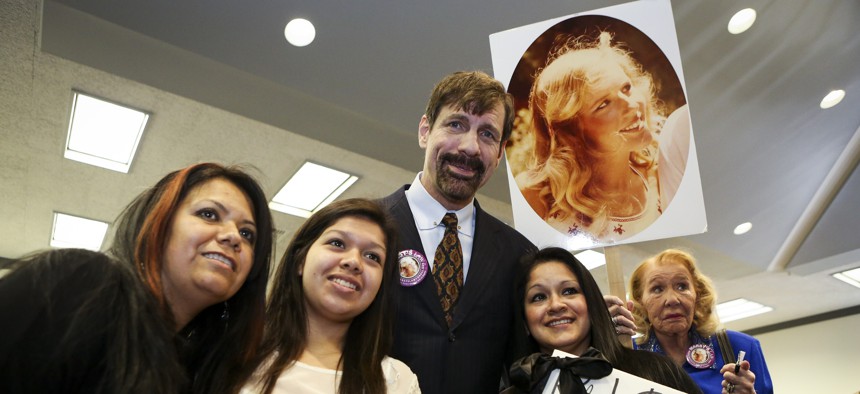‘Marsy’s Law’ Protections for Crime Victims OK’d in 6 States

Dr. Henry T. Nicholas III, who has funded campaigns for Marsy's Law measures across the country, poses with victims of violence during the Orange County Victims' Rights March and Rally, Friday, April 26, 2013, in Santa Ana, Calif. AP Photo
The ballot measures give crime victims new rights during legal proceedings.
This article was originally published by Stateline, an initiative of The Pew Charitable Trusts.
Voters in six states have passed a ballot measure version of “Marsy’s Law,” which grants crime victims a list of rights under the state constitution, such as the right to confer with the prosecution and attend key court proceedings.
The Marsy’s Law for All Campaign spent almost $70 million on its effort across Florida, Georgia, Kentucky, Nevada, North Carolina and Oklahoma, according to Ballotpedia, a nonprofit website that tracks ballot measures.
“It is gratifying to know that innocent victims of crime in these six states will not have to suffer the injustices that my family endured upon my sister’s murder,” Henry Nicholas, who heads the campaign, said in a press release, Forbes reported. “These are rights that all Americans deserve.”
Some legal experts worry that the push to give crime victims constitutional rights equal to those of criminal defendants could set up a clash over core aspects of the U.S. legal system, such as the accused person’s Sixth Amendment right to due process.
That’s because Marsy’s law would allow victims to have a bigger role in legal proceedings from the get-go, before the alleged perpetrator has pleaded innocent or guilty. Researchers have found that emotional statements from victims in court can make jurors angry and more eager to punish defendants—particularly when a victim is white, DePaul University law professor Susan Bandes wrote in The Atlantic.
The law won’t take effect yet in Kentucky, in fact, because of a legal fight there. A recent court ruling found the measure’s wording was too vague and didn’t adequately describe the amendment’s impacts, according to the Louisville Courier Journal, but the measure stayed on the ballot because it was too late to remove it. The votes were counted, but the state Supreme Court has yet to rule on the case.
Supporters of the ballot measures, however, say that victims need to have a greater voice in the criminal justice system and that victims’ rights laws in many states don’t go far enough. All six states where voters faced Marsy’s Law amendments on the ballot this year already had a victims’ rights law or constitutional amendment on the books.
The Marsy’s Law amendments vary from state to state, but all make it a constitutional right for people directly harmed by a crime to request and receive notification when the alleged perpetrator is released from jail or prison, as Stateline has previously reported.
They also spell out a right to be informed of and attend public proceedings involving the criminal; to be heard in any sentencing, release and plea proceedings; and in the case of Nevada and Oklahoma, to refuse interviews or other requests made by the accused person unless ordered to do so by a subpoena or court order.
The ballot measures in Florida, Georgia, Kentucky, Nevada and Oklahoma this year faced no organized opposition from a political action committee, according to Ballotpedia.
In North Carolina, two committees—By the People and Stop Deceptive Amendments—registered in opposition to the Marsy’s Law amendment and all the other amendments on the ballot.
Marsy’s Law is named for Marsalee “Marsy” Nicholas, a college student who was murdered by her ex-boyfriend in 1983. Her billionaire brother, Henry, is the primary funder of the Marsy’s Law for All campaign.
Since 2008, voters have approved versions of Marsy’s Law in California, Illinois, Ohio, North Dakota and South Dakota.
NEXT STORY: Medicaid Expansion Won Big on Election Day





